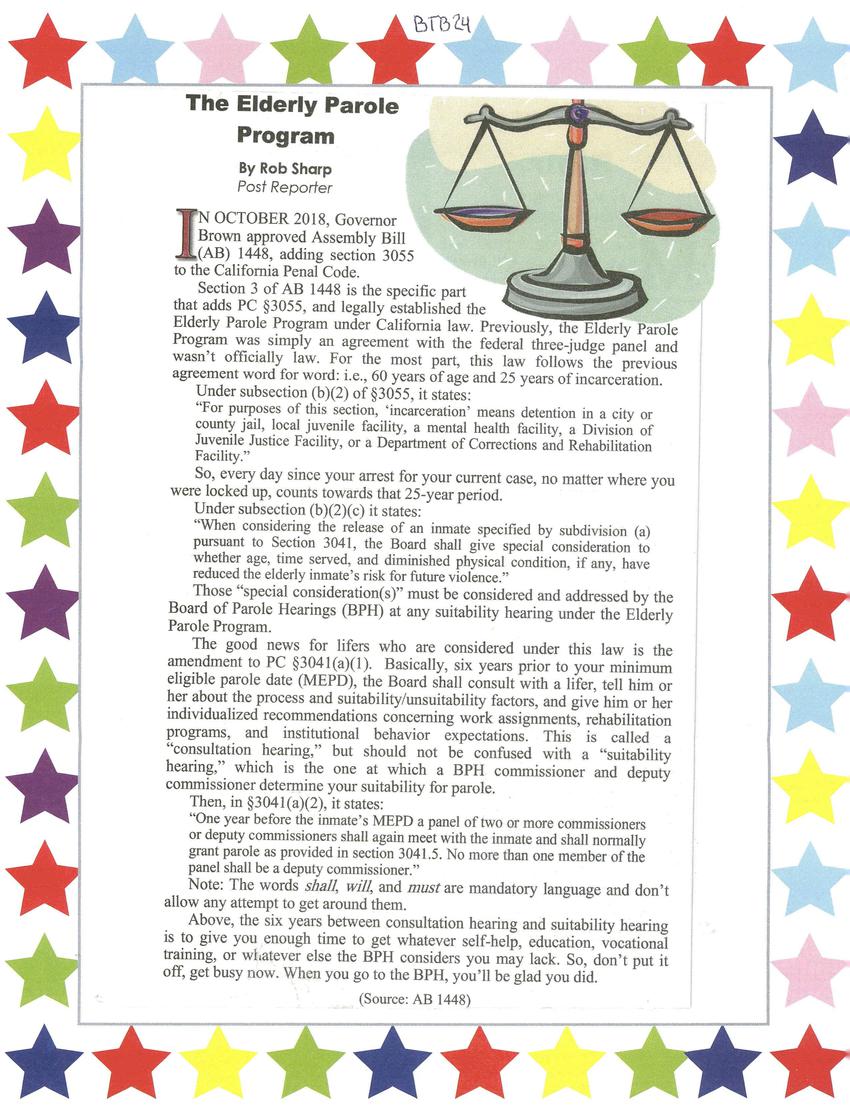
Transcription
The Elderly Parole Program
By Bob Sharp
Post Reporter
In October 2018, Governor Brown approved Assembly Bill (AB) 1448, adding section 3055 to the California Penal Code.
Section 3 of AB 1448 is the specific part that adds PC Section 3055, and legally established the Elderly Parole Program under California law. Previously, the Elderly Parole Program was simply an agreement with the federal three-judge panel and wasn't officially law. For the most part, this law follows the previous agreement word for word: i.e., 60 years of age and 25 years of incarceration.
Under subsection(b)(2) of Section 3055, it states:
"For purposes of this section, 'incarceration' means detention in a city or county jail, local juvenile facility, a mental health facility, a Division of Juvenile Justice Facility, or a Department of Corrections and Rehabilitations Facility."
So, every day since your arrest for your current case, no matter where you were locked up, counts towards that 25-year preiod.
Under subsection(b)(2)(s), it states:
"When considering the release of an inmate specified by subdivision (a) persuant to Section 3041, the Borad shall give special consideration to whether age, time served, and diminished physical conditions, if any, have reduced the elderly inmate's risk for future violence."
Those "special consideration(s)" must be considered and addressed by the Board of Parole Hearings (BPH) at any suitability hearing under the Elderly Parole Program.
The good news for lifers who are considered under this law is the amendment to PC Section 3041(a)(1). Basically, six years prior to your minimum eligible parole date (MEPD), the Board shall consult with a lifer, tell him or her about the process and suitability/unsuitability factors, and give him or her individualized recommendations concerning work assignments, rehabilitation programs, and institutional behavior expectations. This is called a "consultation hearing," but should not be confused with a "suitability hearing," which is the one at which a BPH commissioner and deputy commissioner determine your suitability for parole.
Then, in Section 3041(a)(2), it states:
"One year before the inmate's MEPD, a panel of two or more commissioners or deputy commissioners shall again meet with the inmate and shall normally grant parole as provided in Section 3041.5. No more than one member of the panel shall be a deputy commissioner."
Note: The words shall, will, and must are mandatory language and don't allow any attempt to get around them.
Above, the six years between consultation hearing and suitability hearing is to give you enough time to get whatever self-help, education, vocational training, or whatever else the BPH considers you may lack. So, don't put it off; get busy now. When you go to the BPH, you'll be glad you did.
Source: AB 1448
Other posts by this author
|
2023 may 31

|
2023 apr 5

|
2023 mar 19

|
2023 mar 5

|
2023 mar 5

|
2023 mar 5

|
More... |


Replies